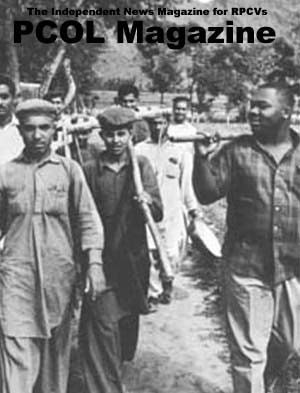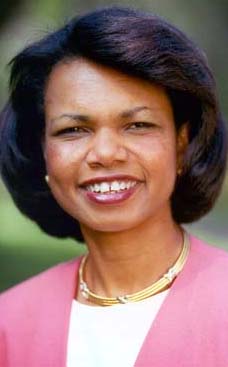2006.03.02: March 2, 2006: Headlines: 45th Anniversary: Speaking Out: Ithaca Journa: Peace Corps still puts idealism to use
Peace Corps Online:
Peace Corps News:
Speaking Out:
January 23, 2005: Index: PCOL Exclusive: Speaking Out (1 of 5) :
Archive of Stories:
2006.03.02: March 2, 2006: Headlines: 45th Anniversary: Speaking Out: Ithaca Journa: Peace Corps still puts idealism to use
Peace Corps still puts idealism to use

Popular images of Peace Corps volunteers living in grass thatch houses still portray reality for many volunteers, but there is also a new image of volunteers with cell phones, electricity and plumbing. The organization has and will continue to adapt to the needs of the communities it serves. It is the flexibility and openness of its volunteers that make this possible. All of this taken together makes the Peace Corps relevant and necessary in the world today. Cynics sell short the power of idealism and public service in assuming the world is no longer a place for Peace Corps. It is this power that can surprise us all.
Peace Corps still puts idealism to use
Peace Corps still puts idealism to use
This week Peace Corps volunteers will officially celebrate 45 years of Peace Corps service by sharing their experiences with communities across America. Peace Corps Week is an opportunity to remind everyone that Peace Corps is strong, healthy and still very much needed in the world.
There are many common misconceptions of Peace Corps service and life overseas. For example, there are people who are astonished to learn that the current global environment is “safe” enough for a volunteer organization such as Peace Corps to still exist. Since its inception Peace Corps volunteers have worked under less than ideal conditions. The challenges in today's world are no more a test of the organization's resilience than those of the past.
President Kennedy established the Peace Corps by executive order on March 1, 1961, which was a period of extreme tension and hostility in the world. The Cuban Missile Crisis was less than two years away, the foundations for escalating war in Indochina were already in place, and a third world war in Europe between the Soviet Union and the United States appeared probable. In spite of this, President Kennedy and Sargent Shriver, the first Peace Corps director, believed that the geo-political tension in the world could in some measure be attenuated by the idealism and public service of ordinary Americans participating in grassroots community development.
Peace Corps volunteers have honored that vision by representing the admirable qualities of Americans around the world in dozens of professional fields for 45 years. Through their presence at the local level, they have displayed their common humanity to people in 138 countries in a way that no public relations campaign ever could. The world today again appears on the verge of conflagration, and yet there are still over 7,000 ordinary Americans living abroad in 76 countries, putting their idealism and professional skills to good use. The Peace Corps has evolved since 1961 and now is more responsive than ever before. For example, programs in China address the language and cultural barriers between our two countries, and programs in Mexico progressively address the digital divide. What surprises many people is that Peace Corps programs have adapted to address the needs of host communities in ways that represent the goals and aspirations of the communities themselves. Peace Corps volunteers are facilitators of work that contributes to positive change in communities—not the bearers of any particular developmental or political ideology.
Peace Corps Volunteers represent a broad array of American social and cultural perspectives. As a result, when people ask returned volunteers about their experiences, they never get the same answer. True, many volunteers have things in common, but their experiences are as diverse as their individual personalities. Volunteers spend 27 months attempting to create the impetus for positive change, one person and one community at a time. It is the intimate contact and relationships that Peace Corps Volunteers foster with their host communities that create the unique experiences each volunteer has. It also allows people in the host communities see that “American” is synonymous with diversity.
Popular images of Peace Corps volunteers living in grass thatch houses still portray reality for many volunteers, but there is also a new image of volunteers with cell phones, electricity and plumbing. The organization has and will continue to adapt to the needs of the communities it serves. It is the flexibility and openness of its volunteers that make this possible. All of this taken together makes the Peace Corps relevant and necessary in the world today. Cynics sell short the power of idealism and public service in assuming the world is no longer a place for Peace Corps. It is this power that can surprise us all. Help us further contribute to it by celebrating 45 years of Peace Corps service this week. For more information about the Peace Corps, please visit www.peacecorps.gov or www.rpcv.org or contact peacecorps@cornell.edu.
. . .
Jarret Cassaniti worked in Zambia from 2003-05. Brian White served in Kyrgyzstan in 2001 and Mongolia from 2002-04. Both Peace Corp veterans are Ithaca residents.
Originally published March 2, 2006
When this story was posted in March 2006, this was on the front page of PCOL:





Peace Corps Online The Independent News Forum serving Returned Peace Corps Volunteers
 | March 1, 1961: Keeping Kennedy's Promise
On March 1, 1961, President John F. Kennedy issues Executive Order #10924, establishing the Peace Corps as a new agency: "Life in the Peace Corps will not be easy. There will be no salary and allowances will be at a level sufficient only to maintain health and meet basic needs. Men and women will be expected to work and live alongside the nationals of the country in which they are stationed--doing the same work, eating the same food, talking the same language. But if the life will not be easy, it will be rich and satisfying. For every young American who participates in the Peace Corps--who works in a foreign land--will know that he or she is sharing in the great common task of bringing to man that decent way of life which is the foundation of freedom and a condition of peace. " |
 | The Peace Corps Library
The Peace Corps Library is now available online with over 40,000 index entries in 500 categories. Looking for a Returned Volunteer? Check our RPCV Directory. New: Sign up to receive PCOL Magazine, our free Monthly Magazine by email. Like to keep up with Peace Corps news as it happens? Sign up to recieve a daily summary of Peace Corps stories from around the world. |
 | Paid Vacations in the Third World?
Retired diplomat Peter Rice has written a letter to the Wall Street Journal stating that Peace Corps "is really just a U.S. government program for paid vacations in the Third World." Director Vasquez has responded that "the small stipend volunteers receive during their two years of service is more than returned in the understanding fostered in communities throughout the world and here at home." What do RPCVs think? |
 | RPCV admits to abuse while in Peace Corps
Timothy Ronald Obert has pleaded guilty to sexually abusing a minor in Costa Rica while serving there as a Peace Corps volunteer. "The Peace Corps has a zero tolerance policy for misconduct that violates the law or standards of conduct established by the Peace Corps," said Peace Corps Director Gaddi H. Vasquez. Could inadequate screening have been partly to blame? Mr. Obert's resume, which he had submitted to the Peace Corps in support of his application to become a Peace Corps Volunteer, showed that he had repeatedly sought and obtained positions working with underprivileged children. Read what RPCVs have to say about this case. |
 | Why blurring the lines puts PCVs in danger
When the National Call to Service legislation was amended to include Peace Corps in December of 2002, this country had not yet invaded Iraq and was not in prolonged military engagement in the Middle East, as it is now. Read the story of how one volunteer spent three years in captivity from 1976 to 1980 as the hostage of a insurrection group in Colombia in Joanne Marie Roll's op-ed on why this legislation may put soldier/PCVs in the same kind of danger. Latest: Read the ongoing dialog on the subject. |
 | PC establishes awards for top Volunteers
Gaddi H. Vasquez has established the Kennedy Service Awards to honor the hard work and service of two current Peace Corps Volunteers, two returned Peace Corps Volunteers, and two Peace Corps staff members. The award to currently serving volunteers will be based on a demonstration of impact, sustainability, creativity, and catalytic effect. Submit your nominations by December 9. |
 | Friends of the Peace Corps 170,000 strong
170,000 is a very special number for the RPCV community - it's the number of Volunteers who have served in the Peace Corps since 1961. It's also a number that is very special to us because March is the first month since our founding in January, 2001 that our readership has exceeded 170,000. And while we know that not everyone who comes to this site is an RPCV, they are all "Friends of the Peace Corps." Thanks everybody for making PCOL your source of news for the Returned Volunteer community. |
Read the stories and leave your comments.

Some postings on Peace Corps Online are provided to the individual members of this group without permission of the copyright owner for the non-profit purposes of criticism, comment, education, scholarship, and research under the "Fair Use" provisions of U.S. Government copyright laws and they may not be distributed further without permission of the copyright owner. Peace Corps Online does not vouch for the accuracy of the content of the postings, which is the sole responsibility of the copyright holder.
Story Source: Ithaca Journa
This story has been posted in the following forums: : Headlines; 45th Anniversary; Speaking Out
PCOL31856
23















